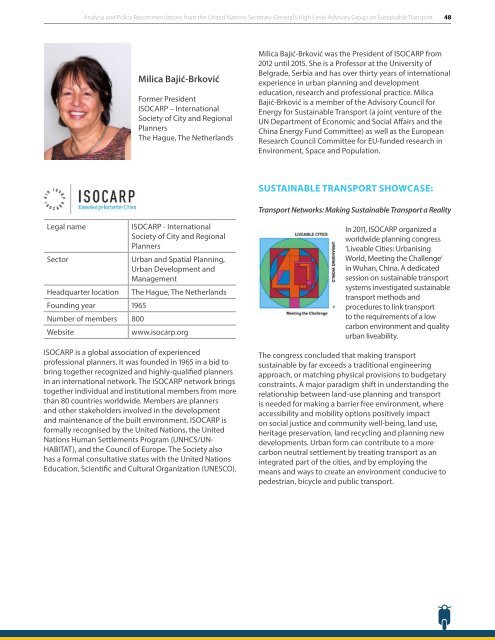MOBILIZING DEVELOPMENT
a5OQ306q56U
a5OQ306q56U
You also want an ePaper? Increase the reach of your titles
YUMPU automatically turns print PDFs into web optimized ePapers that Google loves.
Analysis and Policy Recommendations from the United Nations Secretary-General’s High-Level Advisory Group on Sustainable Transport 48<br />
Milica Bajić-Brković<br />
Former President<br />
ISOCARP – International<br />
Society of City and Regional<br />
Planners<br />
The Hague, The Netherlands<br />
Milica Bajić-Brković was the President of ISOCARP from<br />
2012 until 2015. She is a Professor at the University of<br />
Belgrade, Serbia and has over thirty years of international<br />
experience in urban planning and development<br />
education, research and professional practice. Milica<br />
Bajić-Brković is a member of the Advisory Council for<br />
Energy for Sustainable Transport (a joint venture of the<br />
UN Department of Economic and Social Affairs and the<br />
China Energy Fund Committee) as well as the European<br />
Research Council Committee for EU-funded research in<br />
Environment, Space and Population.<br />
SUSTAINABLE TRANSPORT SHOWCASE:<br />
Transport Networks: Making Sustainable Transport a Reality<br />
Legal name<br />
ISOCARP - International<br />
Society of City and Regional<br />
Planners<br />
Sector<br />
Urban and Spatial Planning,<br />
Urban Development and<br />
Management<br />
Headquarter location The Hague, The Netherlands<br />
Founding year 1965<br />
Number of members 800<br />
Website<br />
www.isocarp.org<br />
ISOCARP is a global association of experienced<br />
professional planners. It was founded in 1965 in a bid to<br />
bring together recognized and highly-qualified planners<br />
in an international network. The ISOCARP network brings<br />
together individual and institutional members from more<br />
than 80 countries worldwide. Members are planners<br />
and other stakeholders involved in the development<br />
and maintenance of the built environment. ISOCARP is<br />
formally recognised by the United Nations, the United<br />
Nations Human Settlements Program (UNHCS/UN-<br />
HABITAT), and the Council of Europe. The Society also<br />
has a formal consultative status with the United Nations<br />
Education, Scientific and Cultural Organization (UNESCO).<br />
In 2011, ISOCARP organized a<br />
worldwide planning congress<br />
‘Liveable Cities: Urbanising<br />
World, Meeting the Challenge’<br />
in Wuhan, China. A dedicated<br />
session on sustainable transport<br />
systems investigated sustainable<br />
transport methods and<br />
procedures to link transport<br />
to the requirements of a low<br />
carbon environment and quality<br />
urban liveability.<br />
The congress concluded that making transport<br />
sustainable by far exceeds a traditional engineering<br />
approach, or matching physical provisions to budgetary<br />
constraints. A major paradigm shift in understanding the<br />
relationship between land-use planning and transport<br />
is needed for making a barrier free environment, where<br />
accessibility and mobility options positively impact<br />
on social justice and community well-being, land use,<br />
heritage preservation, land recycling and planning new<br />
developments. Urban form can contribute to a more<br />
carbon neutral settlement by treating transport as an<br />
integrated part of the cities, and by employing the<br />
means and ways to create an environment conducive to<br />
pedestrian, bicycle and public transport.


